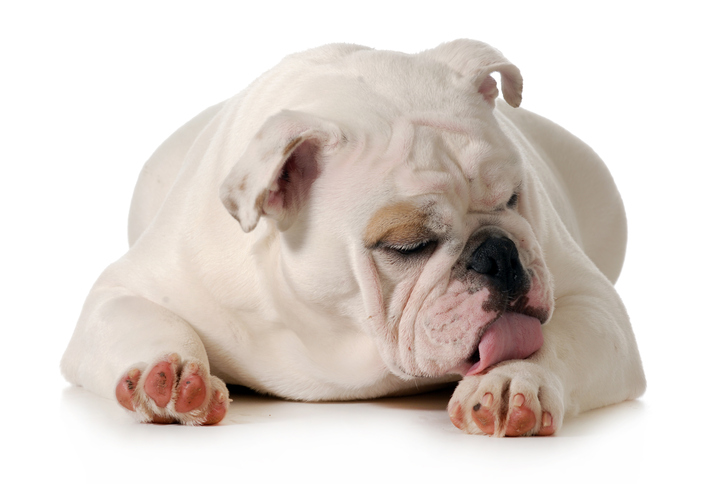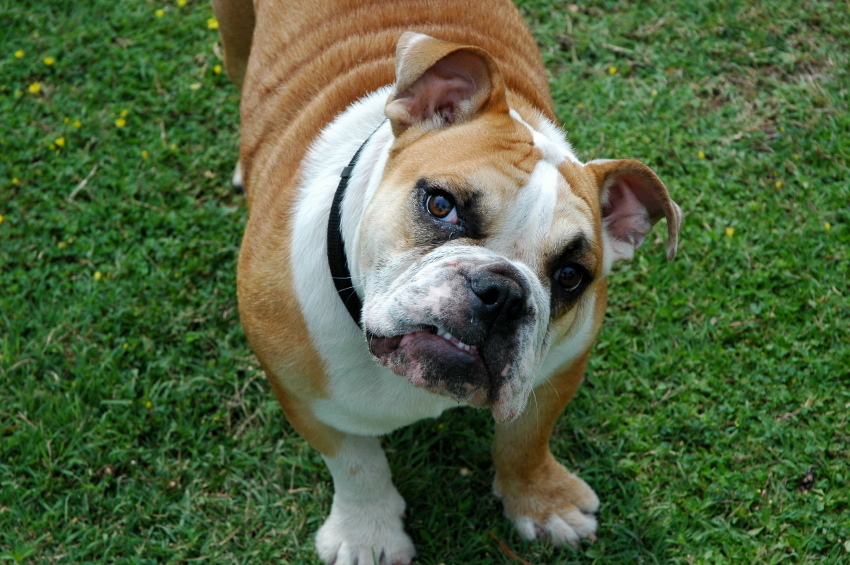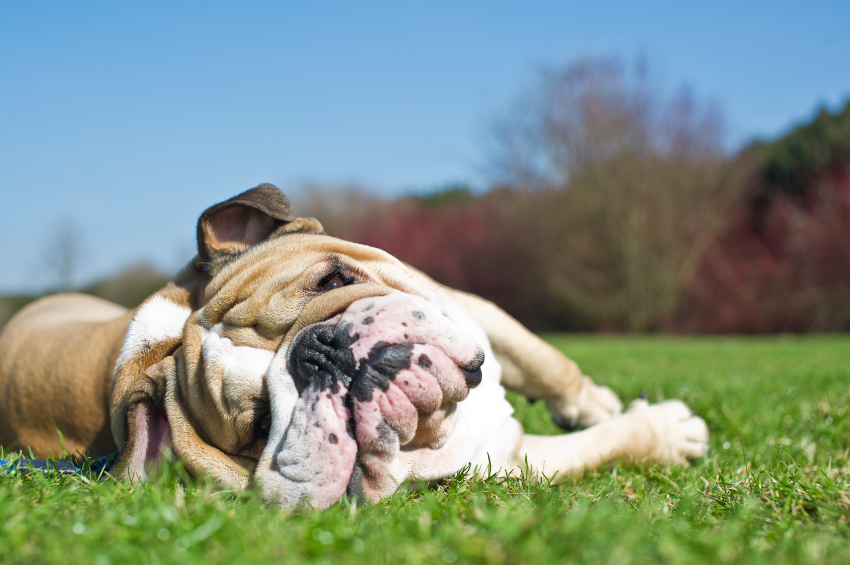Food allergies in Bulldogs are more widespread than any other canine breed due to their genetic makeup. As a responsible pet parent, you must be aware of common Bulldog allergies and how to tackle them.

Cheap dog food – especially those with generic or unlabeled meat source – can cause allergic reactions in your Bulldog. Though picking the right dog food for your pet can be a headache, it is worth the pain considering the threat of allergy. Compared to other dog breeds, Bulldogs suffer from tummy upsets more frequently and feeding your dog low-quality dog food is definitely a risk.
Common Causes of Food Allergies in Bulldogs
There are many food ingredients that can cause allergies in your Bulldog. Many dogs have been found to experience allergies after consuming foods that contain any of the following ingredients.
- Wheat
- Corn
- Soy
- Pork
- Beef
- Chicken
- Dairy
- Eggs
- Fish
- Artificial seasonings
- Artificial preservatives
- Food dyes
Symptoms of Food-Related Bulldog Allergies
If your Bulldog shows any of these signs, you are probably giving him food that contains an ingredient he is allergic to.
- Runny or soft stool
- Gas/flatulence
- Chronic ear infection
- Excessive shedding
- Pooping more frequently than usual
- Excessive eye discharge and tear stains
- Itching
- Redness of the skin
- Presence of rashes, hives, scabs, or bumps on the skin
Note that the symptoms of Bulldog allergies are similar to other conditions and health problems. Bacterial infections, viral infections, and internal parasites can cause tummy problems and diarrhea. On the other hand, external parasites, such as ticks, fleas, and mites can cause skin issues. For this reason, the first thing to do if you see symptoms of Bulldog allergies on your pet is to visit the veterinarian. Skin scraping and blood tests are done to rule out other possible diseases.
How To Identify the Cause of Allergy in Your Bulldog
The key to stopping your Bulldog’s allergies is to identify the specific ingredient that causes it. This can be quite difficult. Here are some ways on how to identify the cause of your Bulldog’s allergy.
Allergy Elimination Diet
You will need to change your Bulldog’s diet every now and then until you find out which ingredients cause your Bulldog’s allergic reactions. This is called allergy elimination diet and can take months.
Here are a few things to keep in mind when developing an allergy elimination diet for your Bulldog.
Check the labels
To determine which food ingredients cause allergies in your Bulldog, check the label of your Bulldog’s current dog food and treats and list down their ingredients. Note the kind of grains and meat source your Bulldog’s current dog food contains. This way you will have an idea about the potential cause of your Bulldog’s food allergies.
Switch to a new dog food
The second step is to change your Bulldog’s diet. Make sure to check the ingredients carefully. Choose a dog food with a different protein source or grain content.
It is better to get a single-protein dog food when your Bulldog is on the allergy elimination diet. This way, it will be easier to pinpoint which protein sources he is allergic to.
Observe your Bulldog’s body
Check if your Bulldog’s allergies are starting to dissipate a few days after being on a new dog food. If your Bulldog’s allergies keep showing, then the new food may still contain ingredients your Bulldog is allergic to. In this case, switch to another dog food brand with different ingredients.
If the symptoms of Bulldog allergies stop, take note of the ingredients and add them to your Bulldog’s “safe food list.”
Reintroduce the allergy-causing dog food
Once your Bulldog’s allergy symptoms subside, reintroduce him to his previous food – the one that caused the allergies. Allergic reactions can begin to show after a few hours to a few days. If your Bulldog begins showing allergy symptoms once again, then it is time to stop giving him that dog food and others with similar ingredients.
However, do note that dogs can experience severe allergic reaction or anaphylaxis in 3 to 30 minutes after consumption or being in contact with an allergen – but such cases are very rare.
Find different dog foods that are safe for your Bulldogs
Once you figure out which food ingredient your Bulldog is allergic to, you can now choose which dog food brand and ingredients are safe for your Bulldog.
The goal is to find dog foods that Bulldog can tolerate. Oddly, some Bulldogs develop allergies from something they have eaten for years without any issues. For this reason, some Bulldog experts recommend rotating your pet’s diet every couple of months.
Nutriscan
Nutriscan is a fairly new diagnostic test that helps identify the commonly seen food intolerances and sensitivities in dogs. Using a certain amount of the affected dog’s saliva, the test measures both primary immune (IgM) and the secretory immunity (IgA) antibodies to 24 selected foods including the following.
- Beef
- Pork
- Lamb
- Duck
- Chicken
- Turkey
- Venison
- Cow milk
- White Fish
- Salmon
- Rabbit
- Soy
- Corn
- Barley
- Wheat
- Millet
- Peanuts
- Quinoa
- Oat Meal
- Rice
- Potato
- Sweet Potato
- Lentil
- Hen’s Eggs
Nutriscan is not exactly a food allergy test. Technically, it measures the presence of antibodies in the saliva, therefore it pinpoints to causes of bowel problems in dogs. However, many owners and veterinarians use the test to determine which ingredients lead to allergic reactions. They use the findings as guides before putting their pets under allergy elimination diet.
Treating Food-Related Bulldog Allergies
The best way to treat food-related Bulldog allergies is to remove the ingredient or allergen that causes the allergic reaction from your pet’s diet.
Your veterinarian may also prescribe medicines, such as antibiotics, steroids, or antihistamines, to help manage your Bulldog’s symptoms.

